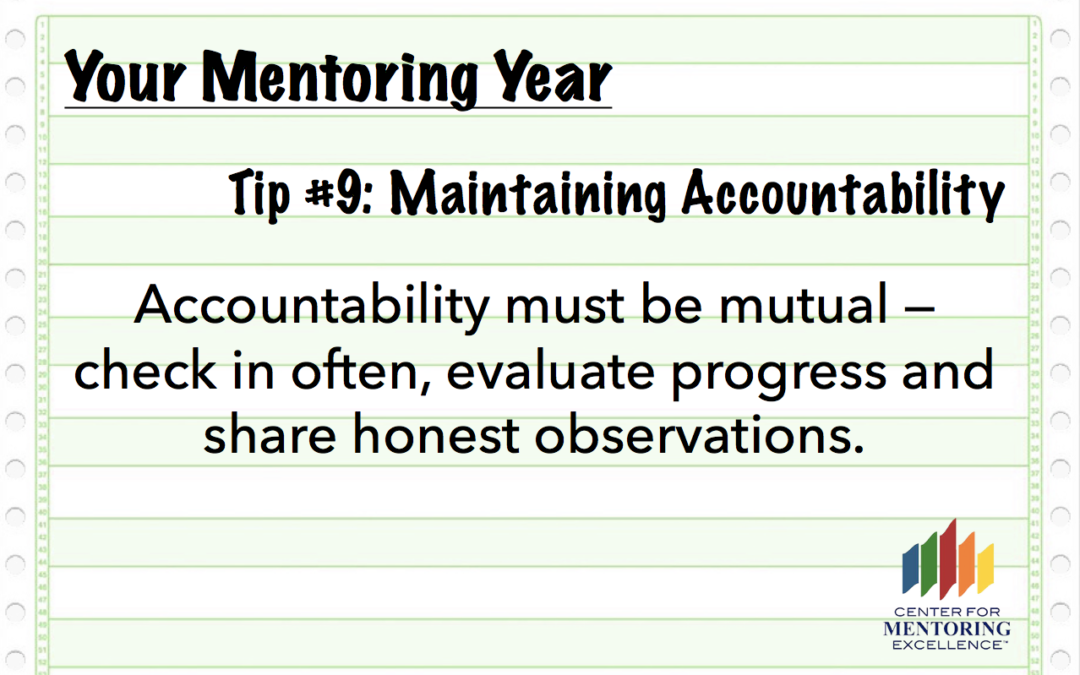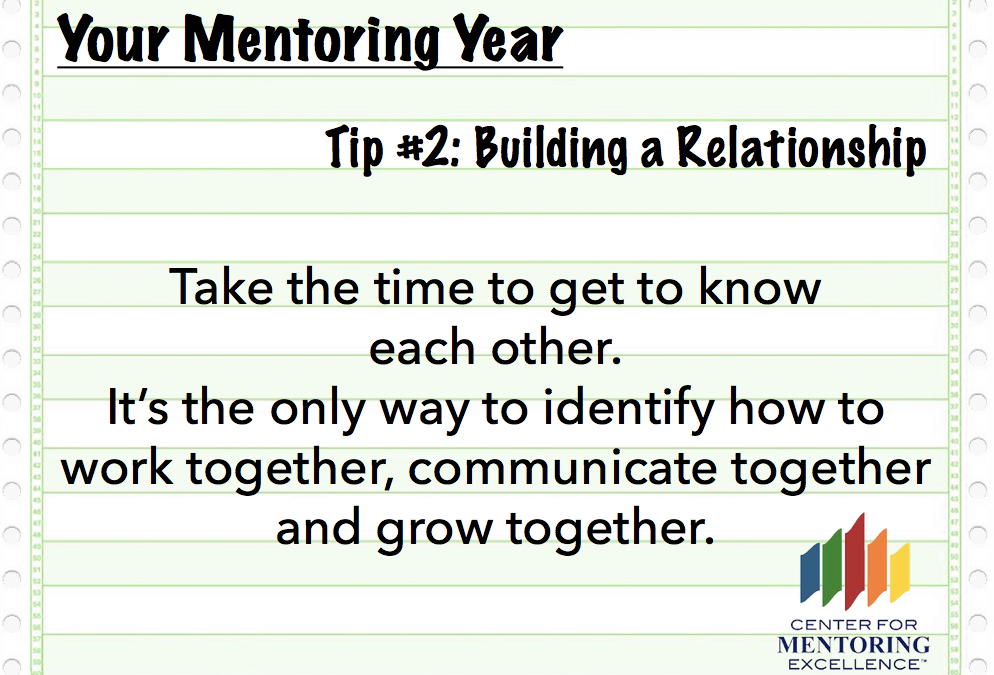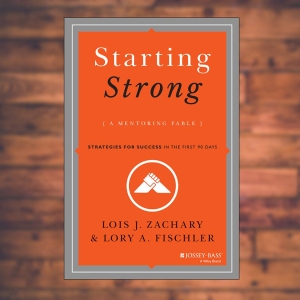
by Center for Mentoring Excellence | Dec 5, 2017 | Advice for Leaders, Facilitating Learning, Goal Setting Conversation, Growth and Development, Making Mentoring Work For You, Mentoring Communication, Mentoring Relationships, Mentoring Training, Supporting Mentors and Mentees
Maintaining accountability in a mentoring relationship is critical for success. But it’s not one-sided. Accountability must be mutual. “Wait, what?” you might be thinking. “Accountability is hard enough, but mutual accountability?”
Yes! Making sure both mentors and mentees are accountable keeps mentoring relationships moving and on track thanks to regular care and attention. Regular monitoring of your relationship guarantees that even when the relationship seems to be going well, you can still promote mutual accountability and, therefore, a healthy relationship.
How do you get started? Use the following conversation tips to provide a framework that drives mutual accountability — and helps maintain it.
-
Check in at the beginning of your meeting. Regularly ask, “How is it going?” Probe your mentee’s response, and take it to a deeper level.
-
Share your observations about how things are going and what concerns you have about the learning process. For example, “I’ve noticed that our discussions are very general and theoretical. Are you finding them helpful?”
-
Take a step back before you go forward. For example, “Let’s take a look at how we’re doing. What’s particularly helpful to you in your learning? What has been least helpful? What do you think is going well? What do we need to improve? What kind of additional assistance do you need?”
-
Use your mentee’s goals as benchmarks for measuring the progress and achievement of learning goals. Refer to them frequently. Evaluating progress regularly maintains momentum, keeps learning goals at the forefront of the relationship and holds partners mutually accountable for achieving them.

by Center for Mentoring Excellence | May 8, 2017 | Facilitating Learning, Growth and Development, Making Mentoring Work For You, Mentoring Communication, Mentoring Questions, Mentoring Relationships, Supporting Mentors and Mentees
Taking the time to work on a mentoring relationship is not always easy. But these relationships are truly the heart of any successful mentoring endeavor. In fact, it’s often a prerequisite for success. Mentors and mentees who discuss their relationship expectations end up experiencing exponentially more success than those who don’t.
One mentee, an associate at a large law firm, lamented that the relationship wasn’t working because her mentor focused only on the path to partnership. The mentee told us, “That’s not appealing to me. It’s like preparing for a pie-eating contest where the prize is more pie.” That mentoring pair was ultimately unsuccessful because they didn’t take the time to learn how each other tick.
Here are some questions to ask your mentoring partner that will set a strong foundation for the relationship:
- What motivates you in your career?
- How do you learn best? Do you need time to process alone, or do you process best by “thinking aloud”?
- What are your pet peeves?
- Do you like to read? Are you open to article and/or book suggestions? Would that be welcome or feel burdensome?
- Have you had a mentor/mentee in the past? What worked in that relationship? What did not work?
Missed Tip #1? Find it here. And make sure to come back next month for Tip #3!
by Center for Mentoring Excellence | Jan 9, 2015 | Mentoring Relationships, Mentoring Training
Are you from Gen X or Y, anxious to advance your career?
Are you eager make a mark in your organization?
Are you committed to orchestrating your own future?
If you’ve answered “yes” to any of these questions, you will need good mentors if you’re going to be successful.
In our new book, Starting Strong: A Mentoring Fable, you have the opportunity to observe mentoring at work and learn valuable lessons from an experienced mentor about what makes a mentoring relationship successful.
 Cynthia, a talented and successful VP of Marketing and Communications agrees to mentor Rafa, a Gen Y financial analyst. Cynthia enjoys mentoring talented, ambitious employees, but only when she is sure that her time investment will truly make a difference.
Cynthia, a talented and successful VP of Marketing and Communications agrees to mentor Rafa, a Gen Y financial analyst. Cynthia enjoys mentoring talented, ambitious employees, but only when she is sure that her time investment will truly make a difference.
Rafa is new to mentoring and doesn’t know what to do or what to expect. In retrospect, he realizes that he had a lot to learn about mentoring. The truth of the matter is, most mentees, like Rafa, would like to come to mentoring better prepared.
In Starting Strong, you soon discover just how important the first 90 days are to laying the groundwork for a productive and successful mentoring relationship and what you can do to prepare yourself so that your mentoring relationship starts out and stays strong.
Here’s a sneak peek at some of the success strategies you will find in our book:
- Get to know your mentor and help them get to know you.
- Do you feel comfortable being honest and open about your strengths and weaknesses?
- Establish agreements that define your relationship and clarify your expectations.
- How often will you meet?
- What is your understanding about confidentiality?
- Who will set the agenda for your meetings?
- Articulate the goals that will be the focus of your relationship.
- Are they SMART (Specific, Measurable, Achievable, Relevant and Timely) enough to produce tangible results?
- Identify specific learning opportunities that will encourage you to stretch and grow.
- Are you playing it safe, or are you being pushed out of your comfort zone?
- Check in on progress after 90 days.
- What is working?
- What could be better?
- Are you getting the support you need?
- What else are you looking for?
To learn more about what you can do to get your relationship started on the right foot, order your copy of Starting Strong today.
You can also enter to win a free audio book copy of Starting Strong. Simply go to Twitter here, and retweet!





